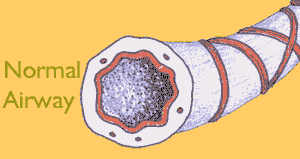Checklist of Symptoms
Many people can have asthma without even realising it. Asthma is different for everyone, you don’t need to suffer a
Continue reading“I couldn’t breathe. I was really frightened!”
An asthma attack is a frightening experience for everyone concerned, whether it is the first or hundredth time it has occurred. It is a gasping, painful struggle to get air into and out of your lungs.
Asthma symptoms vary in severity from occasional mild bouts of breathlessness to daily wheezing that persists despite taking large doses of medication. Asthma can be a dangerous condition because it interferes with gas exchange, and can therefore stop the continuous supply of oxygen and the removal of excess carbon dioxide. Without effective treatment during an attack, exhaustion may worsen respiratory function, and in rare cases, a life-threatening situation known as status Asthmaticus can occur.
What Happens in an Attack?
An asthma attack occurs when the small and medium-sized airways become inflamed and constricted after being exposed to a trigger.

Picture of an Attack
The body reacts to a trigger in three distinct ways:
Muscles wrapped around airways tighten and spasm making the space within the airways smaller (this is known as bronchospasm or bronchoconstriction)
The inner lining of the airways swell, also reducing air space
Excess mucus is produced and this clogs up the airways
These three things result in a feeling of breathlessness and a need to increase your breathing rate. Unfortunately this most natural feeling is actually the wrong thing to do because breathing harder or faster makes it more difficult to exhale air through narrowing airways. This is because of airway resistance.
Asthma attacks may last anywhere from a few minutes to days. The more inflammation there is then the longer the attack will last. Attacks which last for days can be hazardous for a number of reasons: the person is unlikely to maintain adequate nutrition and fluid levels; oxygen levels may become dangerously low and carbon dioxide levels may get dangerously high.
Your doctor may speak of acute asthma and this refers to an actual attack. Chronic asthma refers to the symptoms of asthma, like wheeziness, shortness of breath, which are there almost always to a lesser degree.
Many people can have asthma without even realising it. Asthma is different for everyone, you don’t need to suffer a
Continue readingStatus Asthmaticus is a medical term for a very severe and dangerous condition, which is normally caused by infections or
Continue readingEven mild asthmatics can have severe attacks and therefore it is important to recognise the early signs so that you
Continue readingThe symptoms of asthma vary greatly from person to person and from attack to attack for the same person. Your
Continue reading